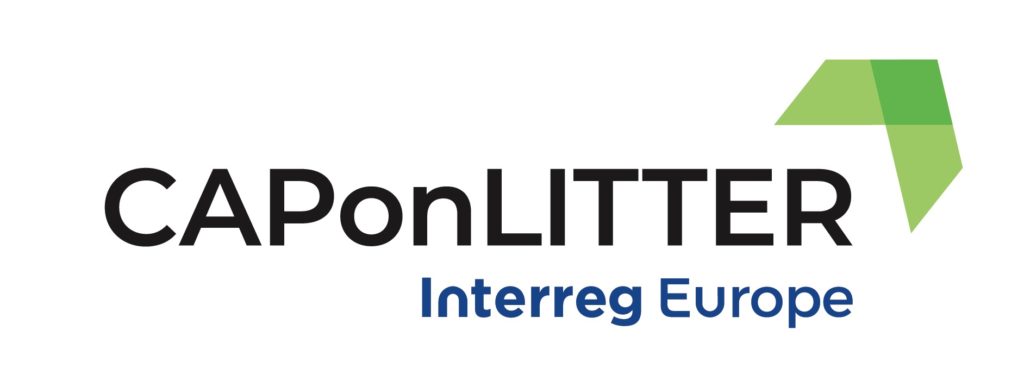Capitalising good coastal practices and improving policies to prevent marine litter
PGI06172, CAPonLITTER
www.interregeurope.eu/caponlitter
Project consortium:
NOVA University Lisbon – NOVA School of Science and Technology, Portugal (Lead partner)
Portuguese Environment Agency (APA), Portugal
IRENA – Istrian RegionalEnergy Agency ltd, Croatia
Union of Bulgarian BlackSea Local Authorities (UBBSLA), Bulgaria
Region of Crete, Greece
Zero Waste Europe, Netherlands
MerTerre, France
German Federal Environment Agency, Germany
ECOAQUA University Institute – University of Las Palmas de Gran Canaria, Spain
Funded by the: Interred Europe, 4.2. Improving resource-efficient economy policies
Total budget: 1,359,334.00 Euro
Duration: 42 months (01.08.2019-31.01.2023)
Purpose of the project: CAPonLITTER aims at improving policies and practices that can help in preventing marine litter that results from coastal tourism and recreational activities. More specifically, the project will focus on key fractions of waste, such as plastic food and drink containers originating from beach facilities and recreational events, due to improper behaviour of consumers but also to lack of incentives and structures for prevention, collection and recycling of waste.
The project involves authorities and organisations from Portugal, Spain, France, Croatia, Greece, Bulgaria and Germany, territories in which coastal tourism is a key economic activity, which is not only highly impacted by marine litter but can also put significant pressure on local infrastructures and generate large amounts of unmanaged waste.
More specifically, the project intends to:
- Improve waste performance at critical sites in coastal areas – by improving policies that can regulate and promote better waste performance at beach facilities and services associated to recreational events taking place in coastal areas. Good practices can include:
- commitments to zero waste coastal events and zero waste beach sites; licencing and regulation of services; performance award schemes,
- community-based beach management, etc.
- Improve management of the most critical items (e.g. drink containers) – by improving policies on management of specific packaging items, which are among the most common types of marine litter. Good practices can include: enhance its collection and recycling, such as through
- deposit-refund schemes; voluntary agreements between producers/retailers/recyclers to reduce packaging; taxes/incentives on specific items
- or materials, which can also encourage markets of innovative, more sustainable products.
- Engage key stakeholders, raise awareness and promote responsible conduct among coastal authorities, users and business, in particular related to tourism and recreation at bathing areas. These include e.g. restaurants & snack-bars, shops and retailers at the beach and surrounding areas; coastal events like music and maritime sports festivals – all of which can generate large amounts of plastic waste, such as drink & food containers.
Results:
CAPonLITTER will develop 7 regional Action Plans (APs), 1 for each region, containing recommendations related to:
- a) improvement of the regional policy instruments (PIs) and how they can support and/or finance practices shared and included in the APs;
- b) promotion of policies targeting the 3 specific objectives of the project, and involving different stakeholders:
- Waste performance at beach area facilities and services associated with recreational events taking place in coastal areas;
- Prevention and management of specific packaging items, that are among the most common types of ML resulting from coastal tourism and recreation;
- Decision-making and conduct among coastal authorities, business and other coastal users, in particular, related to tourism and recreation at bathing sites.
8 Partners, supported by an Advisory Partner with a large network of 400 local authorities, will exchange experiences on practices and policies in 7 Interregional Learning Events, involving also key stakeholders from partners’ territories. Further engagement will be achieved through their active participation in 2 workshops in each region and in drafting the APs.
As an important dissemination and communication material, the “CAPonLITTER Green Book: Improving Policies for the Prevention of Marine Litter” will be developed and translated in all languages of the project. This document will present the main proposals included in the Action Plans for the improvement of each of the 7 Policy Instruments addressed, as well as specific examples of the learning gained during the exchange of good practices in the ILE, best examples of participatory processes developed, and rest of project activities. Besides that, 15 press releases, 4 international newsletters, updated information on project’s and partners’ website will ensure wide dissemination. All of this will be sustained by regular steering meetings and periodic progress reports.
![]()
NEWS from the project
1st Regional Stakeholder Workshop in Bulgaria, 29.01.2020 Varna


